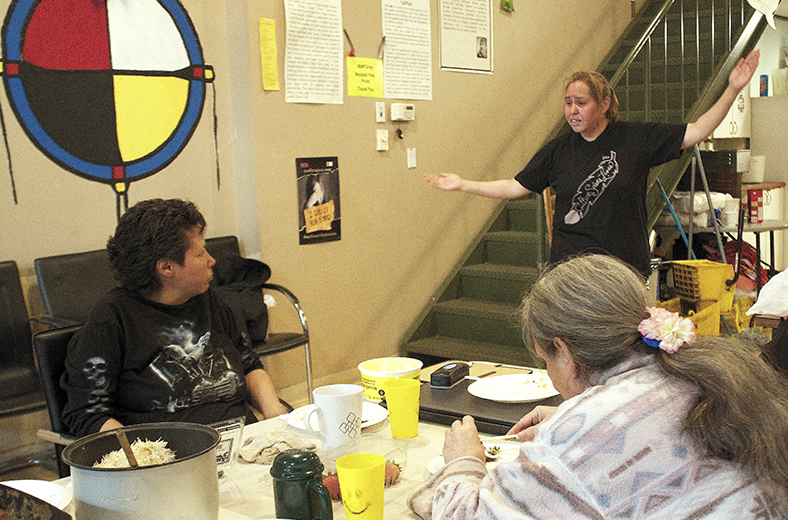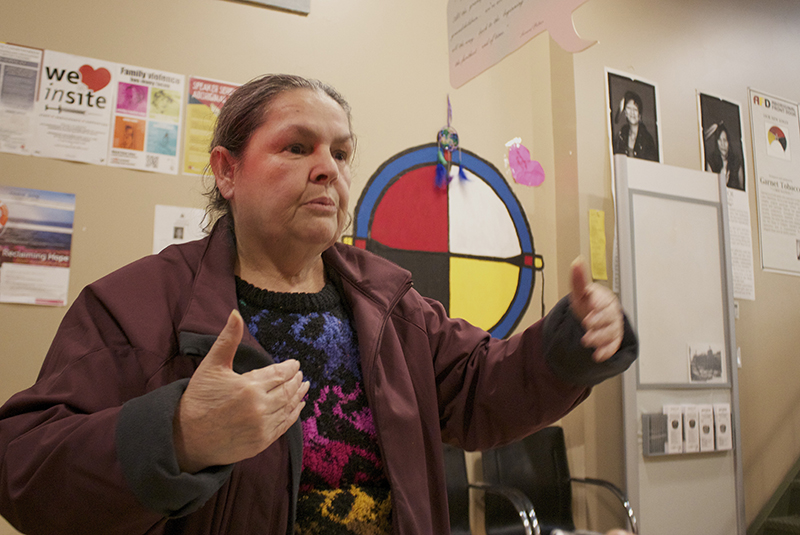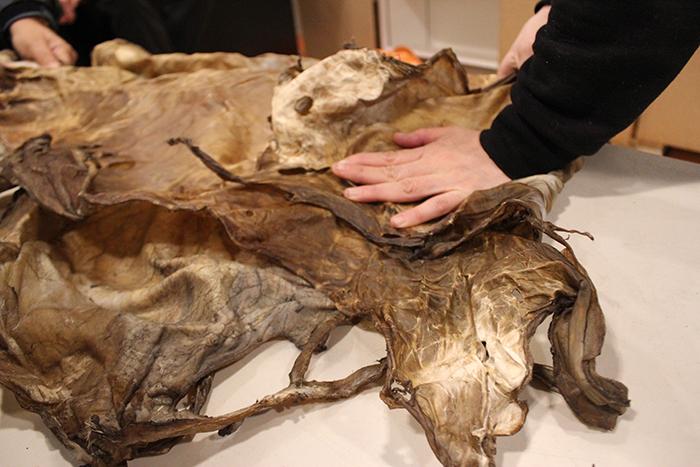Women on the Downtown Eastside find sisterhood talking about menstrual cycles
By: Cherise Seucharan and Eva Uguen-Csenge

By: Cherise Seucharan and Eva Uguen-Csenge
Vancouver’s Downtown Eastside can be a grim place for women, with high rates of trafficking and street violence. But every other Wednesday, a group of women are learning to honour their bodies –– by reviving Indigenous teachings about periods or “moon time”, women’s lodges and the medicine wheel.
“We’re in tune with our bodies and what’s going on,” says Nora Hanuse, founder of the Women’s Healing Circle, which meets at the Aboriginal Front Door Society, a culturally-based wellness centre in the heart of the DTES.
By reviving Indigenous ceremonies in an urban setting, Hanuse hopes she’s helping to undo some of the stigma women hold about their bodies — and creating a safe space to talk about the traumas many have faced as Indigenous women.
To this end, Hanuse incorporates into her weekly meetings what elders have taught her about the powerful role of women.

Hanuse, originally from the Kwakwaka’wakw First Nation near Cape Mudge, says menstrual cycles are considered to be sacred and the time of the month when a woman is at her purest. In some Indigenous communities, women on their monthly cycle will gather in moon lodges where they are revered and served by other members of the community.
Among the groups’ participants are survivors of residential schooling, former foster children, and women who have suffered from substance abuse.
“A lot of them carry a lot of sadness and hurt and anger,” Hanuse says.
Despite the high proportion of Indigenous people living on the Downtown Eastside, Indigenous women still have a hard time finding places to learn or practice traditional ceremonies. Hanuse says many need the women’s group “because they are lost.”
The Women’s Healing Circle is one of the only places in the city that provides a safe and welcoming space for all women, whatever their circumstances.
“I never judge them, no matter what their background is,” says Hanuse. “And that’s how I treat everybody on the Downtown Eastside. I love them as if they were my own children or they were my own family … If they come to me and say ‘I need a hug,’ I give them a hug because there’s not enough humanity down there.”
Living in the Downtown Eastside can require tough skin, something that often translates into hostility between women.
“Women, our claws come out and we get vicious. We become the aggressors because we self-doubt ourselves. We don’t have enough pride in who we are. I’m guilty of it too.”
Hanuse has come a long way herself. She survived childhood abuse only to fall into alcoholism and later an abusive marriage. She found her way back to teachings at the age of 23 after seeking counselling which encouraged her to reconnect with her culture.
Hanuse sought the knowledge of an elder to help lead the group in teachings, so she brought in Elder Lorelei Hawkins, who has lived and worked with women on the DTES for decades.
Hawkins began her journey to becoming a traditional healer when she returned to her Cherokee lands as a young woman. She brings her traditional knowledge of menstrual cycles or moon time to the women and teaches them about their connection to the earth.

“Women have a blood flow from moon time that connects to Mother Earth,” says Hawkins during one of the circles. “Because our blood flow goes to Mother Earth and because we carry life, all of the knowledge and the footprints that come before us, we carry that within us as women.”
Hawkins roots all her conversations about sex and positive body image in Indigenous culture and spirituality, with an underlying message that women have a special, powerful connection with the world.
“It was the women who are the keepers of the ancient knowledge … they’re the keepers of the culture because they actually teach it and show it and enact it,” says Hawkins
Listen: Teachings on Moon Time with Elder Lorelei Hawkins
Hawkins uses the medicine wheel — a circle made of yellow, red, black and white quadrants with each quadrant representing one aspect of a person’s well-being — to explain how to keep all parts of the body in balance.
Hanuse encourages the women to apply these teachings to everyday experiences — and challenge feelings of shame about their bodies and sexuality. She feels women should enjoy their sexuality without judgment.
“If it feels good and it isn’t hurting anyone, you should do it and there’s no shame in it,” Hanuse says.
Hanuse first came to the Aboriginal Front Door Society as a six-month practicum student through her master’s program at UBC. Three years later, she remains with the women’s group, funding the group’s meals and programs — even after the money ran out last year.
“I fund it myself and would keep funding it,” she says. “It’s my baby.”

Hanuse values the independence she has to respond to the individual needs of the women when they arise. She uses a variety of methods to help them cope with negative emotions, incorporating everything from smudging ceremonies to crafting and journaling.
“I do what they need, not what I need, not what some funder tells me they need. I do what the women need,” says Hanuse.
Eva Uguen-Csenge is a multimedia journalist based in Vancouver. Follow her on Twitter @evacsenge
Cherise Seucharan is a journalist and social policy nerd. Follow her on Twitter at @cseucharan